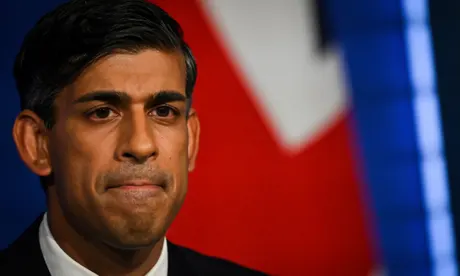
Rishi Sunak has announced a major U-turn on the government’s climate commitments as he promised to put his party on a more radical path in an attempt to close the gap with Labour before the next general election.
In one of his biggest policy changes since taking office, Sunak confirmed the UK would push back the deadline for selling new petrol and diesel cars and the phasing out of gas boilers, prompting furious condemnation from the automobile and energy industries.
Some senior Tories, led by Boris Johnson, criticised the move, with the former prime minister warning his successor that he “cannot afford to falter now” because heaping uncertainty on businesses could drive up prices for British families.
The move was also met with despair by climate scientists and environmental experts who said it would cost consumers more in the long run and threaten the UK’s global leadership on the issue, with the former US vice-president Al Gore saying Sunak was “doing the wrong thing”.
At a Downing Street press conference, Sunak insisted his scaling down of climate policies was “not about the politics”, even though the Conservatives’ conference slogan adorned the lectern and party insiders said the move was about creating dividing lines with Labour.
The prime minister said he was “absolutely unequivocal” about sticking to the commitment to reach net zero carbon emissions by 2050 but that he wanted to take a “more pragmatic, proportionate and realistic approach”. However, he set out little detail on what measures he would now bring in to help meet that target.
Environmental groups are expected to challenge in court the decision to water down the commitments as the government has a legal obligation to set out in detail how it will meet its 2050 target with clear carbon budgets for different sectors.
Sunak said he was trying to “bring the country along with us” and save families thousands of pounds by delaying the green pledges. Yet, businesses and environmental experts have warned that his plans could end up costing them more in the long run.
The prime minister billed his approach as a middle road between those who want far tougher climate action and those who do not believe humans are causing climate breakdown at all, adding that the UK was already ahead of other countries in taking action.
“I’ve got an opportunity to change things and what I don’t want to do is make yet more short-term decisions, easy ways out and ultimately not be straight with the country about what those mean for them,” he said.
“If we continue down this path, we risk losing the consent of the British people. The resulting backlash would not just be against specific policies but against the wider mission itself, meaning we might never achieve our goal.”
However, polls have consistently shown that the majority of people back the transition to net zero in order to limit climate breakdown, although that support starts to wane if costs are piled on consumers.
Sunak indicated that the net zero announcement was the first of several big consumer-focused policy shifts he is expected to outline in the coming weeks, as he attempts to set out his vision for the country and boost the Tories’ poor poll ratings.
“This is just the start. What we begin today is bigger than any single policy or issue. We are going to change the way our politics works. We are going to make different decisions. We won’t take the easy way out. There will be resistance, and we will meet it,” he said.
No 10 sources said the U-turn had been driven by Sunak himself with the guidance of Tory election strategist Isaac Levido, who has been focused on drawing dividing lines with Labour ahead of the next election.
“This is not a new thing since Uxbridge [byelection] or something that has been forced upon him by Isaac or the others: there’s definitely a bit of: ‘We need to let Rishi be Rishi,’” one Tory insider said. “They’ve done the caution bit; it’s not been hugely successful, so we might as well let him do what he wants to do.”
Most Tory MPs were supportive, with some vocally backing the policy. Labour condemned the plan, and sought to use the speech to link the prime minister with his predecessor Liz Truss, who called on the government to row back on its green commitments just days ago.
Ed Miliband, the shadow energy secretary, said: “This is an act of weakness from a desperate, directionless prime minister, dancing to the tune of a small minority of his party. Liz Truss crashed the economy and Rishi Sunak is trashing our economic future.”
However, the party admitted it would not fully restore the targets now junked by the government. Shadow ministers said they would bring back the 2030 deadline to phase out petrol and diesel cars, but would not restore the targets to eliminate gas boilers.
“Labour isn’t going to put people’s bills up,” said Steve Reed, the shadow environment secretary.
Mark Maslin, a professor of climatology at University College London, said: “Sunak’s excuse again and again is not to put the cost burden on the public – as if it is individuals that have to pay for the net zero transition.
“He seems to forget government is there to enable major infrastructure changes and the switch to renewable energy, electric cars, and heat exchangers should be supported because all of them in the long run save people money and improve people’s health.”
Sunak’s announcement came after a chaotic 24 hours, during which details of his planned speech were leaked, causing the prime minister to bring it forward by 48 hours and call an emergency cabinet meeting to sign off the plan.
The most significant rollback is a delay to the deadline for phasing out the sale of new petrol and diesel cars, from 2030 to 2035, in line with other European countries, with those vehicles still allowed to be sold secondhand after that date. The move will require a vote in parliament.
Carmakers have spent hundreds of millions of pounds over the last few years investing in electric vehicle manufacturing to prepare for the 2030 deadline, and many of them reacted angrily to news of the delay.
Lisa Brankin, the chair of Ford UK, said on Wednesday morning: “Our business needs three things from the UK government: ambition, commitment and consistency. A relaxation of 2030 would undermine all three.”
The prime minister also announced a delay to the target for eliminating the sale of gas boilers to homes. Under his new policy, homeowners will only have to replace their gas boilers with electric heat pumps when they are replacing their boilers anyway.
Boiler upgrade grants will be doubled to £7,500 and many homes will be exempt from the demand altogether. Energy efficiency targets for landlords will also be scrapped, along with planned insulation requirements for homeowners.
Before the speech, Chris Norbury, the chief executive of energy supplier E.ON, said: “We risk condemning people to many more years of living in cold and draughty homes that are expensive to heat, in cities clogged with dirty air from fossil fuels, missing out on the regeneration this ambition brings.”
The prime minister also said there would be no new taxes to discourage flying or on eating meat – even though neither of these is government policy – and ruled out proposed recycling schemes with multiple bins or compulsory car-sharing.
The government’s claim that the UK has done better than other countries on cutting emissions is based on decarbonisation carried out decades ago, not under the current government.
Emissions cuts are measured from 1990, and the UK’s dash for gas, which displaced coal for power generation in the 1990s and 2000s, delivered the lion’s share of the roughly 50% fall in carbon emissions since then.
Under this government, while emissions from power generation have continued to fall, those from transport, homes and farming have remained high.



